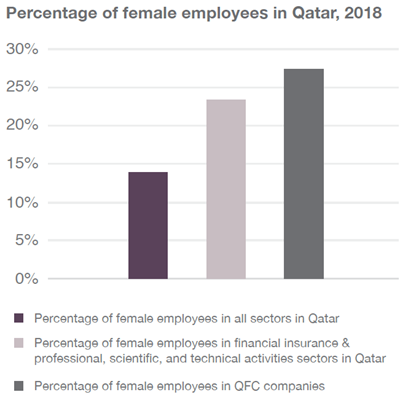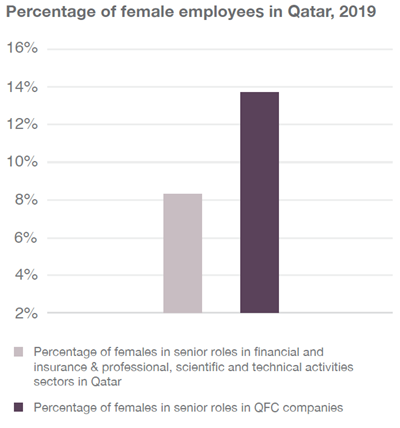QFC’s strong representation of women in its workforce has positive impact on Qatar

Over a quarter of Qatar Financial Centre (QFC) companies’ employees are now women, higher than national and sectoral averages in the Qatari economy.
QFC continues to play a major role in gender diversification in Qatar; the share of women has recently grown, slightly faster than overall growth in QFC employment.
Qatar Financial Centre (QFC) employment data from 2018 reveals that women comprised almost 27% of employees in QFC companies, which demonstrates the key role they are playing in gender diversification in the country. This is higher than the percentage of women in the main associated economic sectors in Qatar and significantly higher than the percentage of women in the workforce in the wider Qatari economy, showing QFC’s role in boosting gender diversity in the Qatari labour force. Further expansion in the female workforce outperformed overall growth in QFC employment between 2018 and 2019: QFC companies’ employment grew by around 10% between these years, and growth in female employment was slightly higher at nearly 11%. From this growing employment pool, around 80% of female QFC employees are highly-skilled and have university or post graduate degrees – showing a high representation of educated women, and also demonstrating QFC’s role in building human capital in the Qatari economy.
Comparisons with the main sectors that QFC companies fall in (i.e., the financial and insurance and professional, scientific and technical activities sectors) also show the key role QFC is playing in enabling women to succeed in more senior level positions. Data from 2019 shows that looking at senior level positions only2, 8.2% of the economically active population in these sectors in Qatar was female. In contrast, 13.5% of senior level positions in QFC companies were filled by women. This shows that QFC companies are not merely outperforming the rest of the sector in representation of women overall, but are providing more opportunities for women in roles where they have an opportunity to lead and shape their organizations – and serve as role models for women aspiring to rise through the ranks in finance and professional services jobs.


QFC is playing a key role in building gender diversity in the country by actively engaging with key stakeholders in Qatar.
Reforms guided by Her Highness Sheikha Moza bint Nasser in terms of human and community development through education, equal opportunities, family welfare and regulation have seen women establish themselves as a formidable part of the workforce in Qatar.
QFC’s unique culture helps build a diverse, inclusive and international professional environment.
QFC’s (as well as the QFCA, through its Administration - Human Capital led initiatives) culture is underpinned by a number of key values that differentiate it in Qatar. Its agenda is firmly supported by the companies within QFC, which include well-known international names with strong global people management practices, including on gender diversity.
Some of QFCA’s key values include the following:
- Ensuring all employees have the same access to opportunities and rights with no gender differentiation (equal pay and given the same work, developmental and promotional opportunities);
- Rewarding and encouraging a diversity-friendly organisational culture that combines an international professional environment without ignoring cultural sensitivities, where required;
- Providing female employees with the freedom to voice contrary opinions without fear of negative consequences and access to the top management (including the CEO) to voice their concerns always;
- Focusing on junior (‘developees’) and mid-level positions through appropriate job enrichment, career development and learning opportunities to ensure they all have access to opportunities to grow;
- With a view to grooming Qatari leaders amongst QFCA’s women workforce, supporting women in taking up secondment opportunities in other organisations to gain cross-organisational experience and add value to these entities, and
- Demonstrating a measurable focus on the representation of women in key positions through clearly observable positive outcomes and results. For instance, two of the Executive Committee (EXCO) members of QFCA are women, several female graduates who started as developees/at junior levels in QFCA a few years ago are now taking on diverse mid-level leadership roles, and more than 50% of the QFCA Human Capital team comprises women.
- These are deeply embedded within QFC’s core culture – and demonstrate QFC’s commitment to gender diversity.
Further, QFC has also taken a number of policy decisions to help build an environment that supports and empowers women.
QFC has also played a key role in building this gender diversity through a series of substantive actions taken by QFC’s Employment Standards Office (ESO). For instance, in September 2018, the ESO signed a Memorandum of Understanding (MoU) with the Ministry of Administrative Development, Labour and Social Affairs (MADSLA) and in 2019, as part of its continuing efforts in this area, the ESO organised a conference to celebrate International Women’s Day in Doha, together with MADSLA and the International Labour Organization (ILO). To ensure continued traction, the ESO is engaged in discussion with the MADSLA, the United Nations Educational, Scientific and Cultural Organization (UNESCO), Qatar Foundation and other key local stakeholders on the establishment of a working group on gender equality as a first step to activate the National Committee for women, elderly, children and people with disabilities. This action is being taken to support Qatar in achieving the United Nations’ (UN) Sustainable Development Goals (SDG) Goal 5 (“Achieve gender equality and empower all women and girls”) while simultaneously harnessing the female talent that is increasingly represented in its employment pool.
This includes a number of other steps to actively support and cater to the needs of its female workforce at a QFC level. These include a number of policy decisions such as increasing maternity leave to 14 weeks, in line with ILO standards; implementing paid daily nursing breaks; introducing a “right to carrier” provision (meaning that female employees have the right to return to work after maternity leave to the same position held before maternity); allowing part-time employment to facilitate work-life balance; instituting protection from termination of female employees for reasons related to marriage and maternity and the creation of a dedicated nursing room within QFC premises. These steps demonstrate QFC’s commitment to building an inclusive and supportive environment to attract, retain and empower female employees. This is likely to have significant economic benefits, particularly by ensuring that experienced female employees remain productive in the skilled workforce.
The strong representation of women in the QFC workforce is likely to have positive impacts on the Qatari economy.
As a basic principle, increasing female participation in the workforce increases the supply of labour in the job market. More importantly, research by the International Monetary Fund (IMF)3 indicates that women and men complement each other in the production process, creating additional benefits for economic growth beyond merely increasing the stock of labour – a so-called “gender diversity” boon on productivity. Other related research has found that increased diversity can lead to better business outcomes, such as market valuation and revenues4. Looking beyond the short-term, having more women in the workforce – particularly in senior roles – can in itself help create female role models, which has a self-reinforcing beneficial effect on encouraging more women into the workforce. All of these factors are therefore likely to have a tangible positive impact on financial performance, such as by increasing company valuations and revenues, which in turn is likely to lead to a stronger and more resilient economy.
Despite the advances made, work still remains.
Despite the advances made globally, there still remains significant work to close the gender gap. According to the World Economic Forum, women still lack the same career prospects as men. The World Bank’s “Women, Business and the Law 2020” index – which covers indicators such as mobility, pay, workplace, parenthood and assets amongst others – shows that Qatar’s progress has been slow: in 2020, Qatar’s rating stands at 32.5 points (out of a maximum of 100 points). Although this needs to be understood in the context of the wider region’s scores – the Middle East & North Africa region has the lowest aggregate score amongst all regions in the world – it still shows that the economy has room for improvement in a number of areas (the workplace is one of the two areas where Qatar has been found to be particularly lacking). To this end, QFC is demonstrating a positive example through its share of women in its workforce, the increase in female employees in recent years and the policy decisions it has implemented to empower its workforce.




 Contrast View
Contrast View
 Increase Text
Increase Text
 Decrease Text
Decrease Text
 Reset Text
Reset Text


